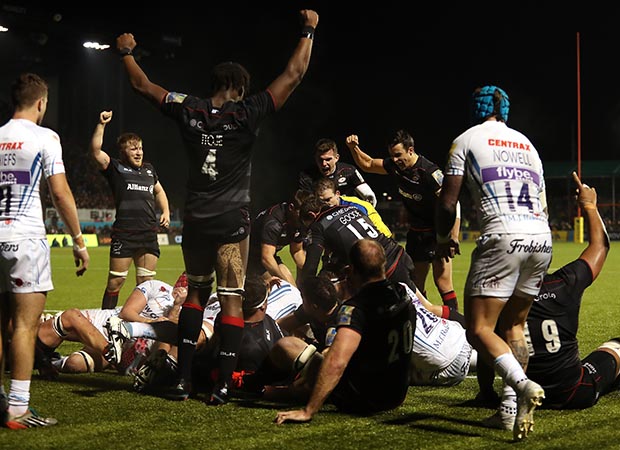 Sometimes you get things wrong and then, when you realise and try to even things up for those you feel you have wronged, it often really opens up a can of worms.
Sometimes you get things wrong and then, when you realise and try to even things up for those you feel you have wronged, it often really opens up a can of worms.
I was at Saracens vs Exeter last week and saw the biggest injustice of the season so far unfolding, when referee Ian Tempest whipped up a storm by sending off Sarries prop Richard Barrington, who was making his 50th first team start for the club. Then Tempest, having realised his mistake, began to err on the side of Sarries to the cost of opponents Exeter.
We all knew the new directive surrounding high tackles was going to create problems, but when something as plain as the tackle by Brad Barritt on Geoff Parling causes the sending off a player whose only crime was being too close to the tackled player, you really have to question the quality of the referee.
The RFU disciplinary panel came to the same conclusion as everybody in the ground (except for Tempest and one assumes his TMO), that Barritt tackled Parling into Barrington, who was unable to avoid his falling body.
After reviewing the tackle for around five minutes on the big screens, referee Tempest came to his conclusion that probably enabled Sarries to cope with just 14 men, far more than if he had made the right call.
The removal of Barrington, although a good prop, did not affect the Sarries team performance in the way that losing Barritt would have. With the comparatively inexperienced Alex Lozowski at fly-half, the loss of the mature, controlling influence of Barritt could have spelled disaster for Saracens, allowing Exeter to win only their second game in their last six matches against the champions.
As much as I believe that referees should be free to make mistakes, and teams have to learn to live with the consequences and adapt their game, when a referee chooses to use the technology available and consult with the TMO, spectators have a right to expect something close to the ‘right decision'.
Although there should never be a witch-hunt of referees who make mistakes, there surely must be accountability. What has to be remembered is referees at the highest levels are now paid handsomely for their services and, as such, they must be prepared to accept a level of responsibility that is far higher than those who refereed in the amateur days.
Failure to act against professional
referees who fail to ‘measure up' to a basic standard undermines the whole refereeing structure, so it is in the interests of the whole game for Unions to act.
News that government through Sports England want the RFU to reduce the number of ‘grassroots'
representatives on their management board from around 62 per cent (eight) to around 25 per cent doesn't seem to make sense.
Why would government want to interfere with the management of a sport that has, over the years, funded the building of their own stadium, grown their participation and become far more inclusive than many of their rivals? Admittedly most of that was achieved during the amateur era but that should be an incentive to encourage more amateurs into senior administer roles.
Rugby is almost as complex a sport to administer as it is to play and the introduction of professionalism has further complicated the governance and management of the game. Over the years since the faithful day in 1995 when the game changed, more and more of the council's powers have been allowed to slip away in the name of streamlining the game to make it ‘fit' for purpose in the ‘modern' era.
With more and more professional staff at the heart of Twickenham, the RFU often appear to be a business and are fast becoming a successful small to medium sized business, but at what cost?
The idea that the council have been able to influence the policy direction of the Union over the last few years is unbelievable as more and more of the games resources have been concentrated into funding the professional game.
It is because of the move from sport to business that government want to change the structure of the management board into a more commercial structure with fewer ‘vested interests' at the controls.
Reality is at last coming home to roost for ‘the turkeys that voted for Christmas' or to sit silent as others forced the emancipation of the once all-powerful committee.
Personally, I think that any more erosion of council powers would be to the detriment of the game as a whole.
What has to be remembered by all is that rugby is first and foremost a sport, a sport that is enjoyed and played by millions around the world for nothing more than the absolute enjoyment of the game itself.
However, if the RFU council want to stop business making a total takeover of the sport, those that have sat in silence over the years will have to willingly find their collective voices before the council are also deemed surplus to requirements.


























